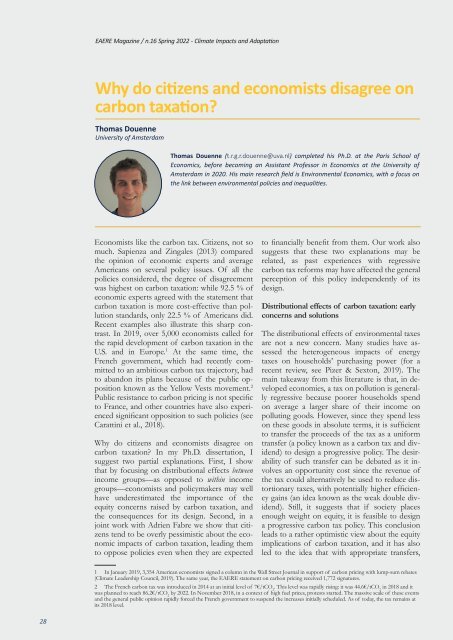EAERE Magazine - N.16 Spring 2022__
You also want an ePaper? Increase the reach of your titles
YUMPU automatically turns print PDFs into web optimized ePapers that Google loves.
<strong>EAERE</strong> <strong>Magazine</strong> / n.16 <strong>Spring</strong> <strong>2022</strong> - Climate Impacts and Adaptation<br />
Why do citizens and economists disagree on<br />
carbon taxation?<br />
Thomas Douenne<br />
University of Amsterdam<br />
Thomas Douenne (t.r.g.r.douenne@uva.nl) completed his Ph.D. at the Paris School of<br />
Economics, before becoming an Assistant Professor in Economics at the University of<br />
Amsterdam in 2020. His main research field is Environmental Economics, with a focus on<br />
the link between environmental policies and inequalities.<br />
Economists like the carbon tax. Citizens, not so<br />
much. Sapienza and Zingales (2013) compared<br />
the opinion of economic experts and average<br />
Americans on several policy issues. Of all the<br />
policies considered, the degree of disagreement<br />
was highest on carbon taxation: while 92.5 % of<br />
economic experts agreed with the statement that<br />
carbon taxation is more cost-effective than pollution<br />
standards, only 22.5 % of Americans did.<br />
Recent examples also illustrate this sharp contrast.<br />
In 2019, over 5,000 economists called for<br />
the rapid development of carbon taxation in the<br />
U.S. and in Europe. 1 At the same time, the<br />
French government, which had recently committed<br />
to an ambitious carbon tax trajectory, had<br />
to abandon its plans because of the public opposition<br />
known as the Yellow Vests movement. 2<br />
Public resistance to carbon pricing is not specific<br />
to France, and other countries have also experienced<br />
significant opposition to such policies (see<br />
Carattini et al., 2018).<br />
Why do citizens and economists disagree on<br />
carbon taxation? In my Ph.D. dissertation, I<br />
suggest two partial explanations. First, I show<br />
that by focusing on distributional effects between<br />
income groups—as opposed to within income<br />
groups—economists and policymakers may well<br />
have underestimated the importance of the<br />
equity concerns raised by carbon taxation, and<br />
the consequences for its design. Second, in a<br />
joint work with Adrien Fabre we show that citizens<br />
tend to be overly pessimistic about the economic<br />
impacts of carbon taxation, leading them<br />
to oppose policies even when they are expected<br />
to financially benefit from them. Our work also<br />
suggests that these two explanations may be<br />
related, as past experiences with regressive<br />
carbon tax reforms may have affected the general<br />
perception of this policy independently of its<br />
design.<br />
Distributional effects of carbon taxation: early<br />
concerns and solutions<br />
The distributional effects of environmental taxes<br />
are not a new concern. Many studies have assessed<br />
the heterogeneous impacts of energy<br />
taxes on households’ purchasing power (for a<br />
recent review, see Pizer & Sexton, 2019). The<br />
main takeaway from this literature is that, in developed<br />
economies, a tax on pollution is generally<br />
regressive because poorer households spend<br />
on average a larger share of their income on<br />
polluting goods. However, since they spend less<br />
on these goods in absolute terms, it is sufficient<br />
to transfer the proceeds of the tax as a uniform<br />
transfer (a policy known as a carbon tax and dividend)<br />
to design a progressive policy. The desirability<br />
of such transfer can be debated as it involves<br />
an opportunity cost since the revenue of<br />
the tax could alternatively be used to reduce distortionary<br />
taxes, with potentially higher efficiency<br />
gains (an idea known as the weak double dividend).<br />
Still, it suggests that if society places<br />
enough weight on equity, it is feasible to design<br />
a progressive carbon tax policy. This conclusion<br />
leads to a rather optimistic view about the equity<br />
implications of carbon taxation, and it has also<br />
led to the idea that with appropriate transfers,<br />
1 In January 2019, 3,354 American economists signed a column in the Wall Street Journal in support of carbon pricing with lump-sum rebates<br />
(Climate Leadership Council, 2019). The same year, the <strong>EAERE</strong> statement on carbon pricing received 1,772 signatures.<br />
2 The French carbon tax was introduced in 2014 at an initial level of 7€/tCO 2<br />
. This level was rapidly rising: it was 44.6€/tCO 2<br />
in 2018 and it<br />
was planned to reach 86.2€/tCO 2<br />
by <strong>2022</strong>. In November 2018, in a context of high fuel prices, protests started. The massive scale of these events<br />
and the general public opinion rapidly forced the French government to suspend the increases initially scheduled. As of today, the tax remains at<br />
its 2018 level.<br />
28













